Leahaleisha
On this page, you find all documents, package deals, and flashcards offered by seller leahaleisha.
- 75
- 0
- 0
Community
- Followers
- Following
75 items
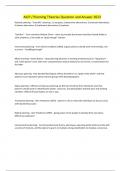
AICP / Planning Theories Question and Answer 2023
Rational planning - "Scientific" planning - 1) set goals; 2) determine alternatives; 3) evaluate alternatives; 4) choose alternative; 5) implement alternative; 6) evaluate "Satisfice" - Term coined by Herbert Simon - refers to principle that human mind has limited ability to solve problems, so we settle on "good enough" solution Incremental planning - From Charles Lindblom (1959), argues planners should work incrementally, one at a time - "muddling through" Mixed scannin...
- Exam (elaborations)
- • 1 pages •
Rational planning - "Scientific" planning - 1) set goals; 2) determine alternatives; 3) evaluate alternatives; 4) choose alternative; 5) implement alternative; 6) evaluate "Satisfice" - Term coined by Herbert Simon - refers to principle that human mind has limited ability to solve problems, so we settle on "good enough" solution Incremental planning - From Charles Lindblom (1959), argues planners should work incrementally, one at a time - "muddling through" Mixed scannin...
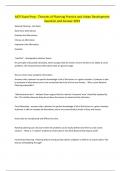
AICP Exam Prep - Theories of Planning Practice and Urban Development Question and Answer 2023
Rational Planning - Set Goals Determine Alternatives Evaluate the Alternatives Choose an Alternative Implement the Alternative Evaluate "satisfice" - developed by Herbert Simon the principle of bounded rationality, which accepts that the human mind is limited in its ability to solve problems. We instead choose alternatives that are good enough. We can never have complete information. Assumes that a planner has perfect knowledge of all of the factors in a given situatio...
- Exam (elaborations)
- • 5 pages •
Rational Planning - Set Goals Determine Alternatives Evaluate the Alternatives Choose an Alternative Implement the Alternative Evaluate "satisfice" - developed by Herbert Simon the principle of bounded rationality, which accepts that the human mind is limited in its ability to solve problems. We instead choose alternatives that are good enough. We can never have complete information. Assumes that a planner has perfect knowledge of all of the factors in a given situatio...
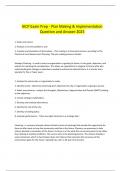
AICP Exam Prep - Plan Making & Implementation Question and Answer 2023
1. Goals and visions; 2. Analysis of current problems; and 3. Creation and evaluation of alternatives. - Plan making is a three-part process, according to The Practice of Local Government Planning. The plan making process includes: Strategic Planning - is used to assist an organization in guiding its future. It sets goals, objectives, and policies for reaching the set objectives. This allows an organization to imagine its future while also understanding the changes in operations needed ...
- Exam (elaborations)
- • 15 pages •
1. Goals and visions; 2. Analysis of current problems; and 3. Creation and evaluation of alternatives. - Plan making is a three-part process, according to The Practice of Local Government Planning. The plan making process includes: Strategic Planning - is used to assist an organization in guiding its future. It sets goals, objectives, and policies for reaching the set objectives. This allows an organization to imagine its future while also understanding the changes in operations needed ...
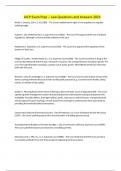
AICP Exam Prep – Law Questions and Answers 2023
Welch v. Swasey; 214 U.S. 91 (1909) - The Court established the right of municipalities to regulate building height. Eubank v. City of Richmond; U.S. Supreme Court (1912) - The Court first approved the use of setback regulations, although it overturned the setbacks in this case. Hadacheck v. Sebastian; U.S. Supreme Court (1915) - The Court first approved the regulation of the location of land uses. Village of Euclid v. Ambler Realty Co.; U.S. Supreme Court (1926) - The Court found...
- Exam (elaborations)
- • 9 pages •
Welch v. Swasey; 214 U.S. 91 (1909) - The Court established the right of municipalities to regulate building height. Eubank v. City of Richmond; U.S. Supreme Court (1912) - The Court first approved the use of setback regulations, although it overturned the setbacks in this case. Hadacheck v. Sebastian; U.S. Supreme Court (1915) - The Court first approved the regulation of the location of land uses. Village of Euclid v. Ambler Realty Co.; U.S. Supreme Court (1926) - The Court found...
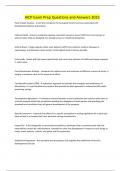
AICP Exam Prep Questions and Answers 2023
Fiscal Impact Analysis - A tool that compares the local government revenues associated with development policies and projects Collector Road - A low-to-moderate capacity road which serves to move traffic from local streets to arterial roads; they are designed d to provide access to residential properties. Arterial Road - A high-capacity urban road; delivers traffic from collector roads to freeways or expressways, and between urban centers at the highest level of service possible L...
- Exam (elaborations)
- • 15 pages •
Fiscal Impact Analysis - A tool that compares the local government revenues associated with development policies and projects Collector Road - A low-to-moderate capacity road which serves to move traffic from local streets to arterial roads; they are designed d to provide access to residential properties. Arterial Road - A high-capacity urban road; delivers traffic from collector roads to freeways or expressways, and between urban centers at the highest level of service possible L...
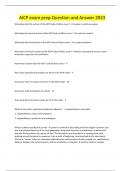
AICP exam prep Question and Answer 2023
What does the first section of the AICP Code of Ethics cover? - Principles to which we aspire What does the second section of the AICP Code of Ethics cover? - Our rules of conduct What does the third section of the AICP Code of Ethics cover? - Our code procedures What does the fourth section of the AICP Code of Ethics cover? - Planners convicted of serious crimes - automatic suspension of certification How many sections does the AICP Code of Ethics have? - 4 How many asp...
- Exam (elaborations)
- • 14 pages •
What does the first section of the AICP Code of Ethics cover? - Principles to which we aspire What does the second section of the AICP Code of Ethics cover? - Our rules of conduct What does the third section of the AICP Code of Ethics cover? - Our code procedures What does the fourth section of the AICP Code of Ethics cover? - Planners convicted of serious crimes - automatic suspension of certification How many sections does the AICP Code of Ethics have? - 4 How many asp...
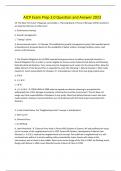
AICP Exam Prep 3.0 Question and Answer 2023
19. The New York Court of Appeals case Golden v. Planning Board of Town of Ramapo (1972) resulted in an important decision in what area? a. Exclusionary housing b. Growth management c. "Takings" claims d. Environmental justice - B. Ramapo, NY established a growth management system that awarded points to development proposals based on the availability of public utilities, drainage facilities, parks, road access, and firehouses. 1. The Disaster Mitigation Act of 2000 required local ...
- Exam (elaborations)
- • 53 pages •
19. The New York Court of Appeals case Golden v. Planning Board of Town of Ramapo (1972) resulted in an important decision in what area? a. Exclusionary housing b. Growth management c. "Takings" claims d. Environmental justice - B. Ramapo, NY established a growth management system that awarded points to development proposals based on the availability of public utilities, drainage facilities, parks, road access, and firehouses. 1. The Disaster Mitigation Act of 2000 required local ...
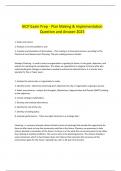
AICP Exam Prep - Plan Making & Implementation Question and Answer 2023
1. Goals and visions; 2. Analysis of current problems; and 3. Creation and evaluation of alternatives. - Plan making is a three-part process, according to The Practice of Local Government Planning. The plan making process includes: Strategic Planning - is used to assist an organization in guiding its future. It sets goals, objectives, and policies for reaching the set objectives. This allows an organization to imagine its future while also understanding the changes in operations needed ...
- Exam (elaborations)
- • 15 pages •
1. Goals and visions; 2. Analysis of current problems; and 3. Creation and evaluation of alternatives. - Plan making is a three-part process, according to The Practice of Local Government Planning. The plan making process includes: Strategic Planning - is used to assist an organization in guiding its future. It sets goals, objectives, and policies for reaching the set objectives. This allows an organization to imagine its future while also understanding the changes in operations needed ...
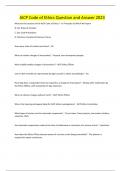
AICP Code of Ethics Question and Answer 2023
What are the sections of the AICP Code of Ethics? - A: Principles to Which We Aspire B: Our Rules of Conduct C: Our Code Procedures D: Planners Convicted of Serious Crimes How many rules of conduct are there? - 26 Who can submit charges of misconduct? - Anyone, even anonymous people. Who initially handles charges of misconduct? - AICP Ethics Officer Can an AICP member be represented by legal counsel in ethics proceedings? - Yes How long does a respondent have to re...
- Exam (elaborations)
- • 2 pages •
What are the sections of the AICP Code of Ethics? - A: Principles to Which We Aspire B: Our Rules of Conduct C: Our Code Procedures D: Planners Convicted of Serious Crimes How many rules of conduct are there? - 26 Who can submit charges of misconduct? - Anyone, even anonymous people. Who initially handles charges of misconduct? - AICP Ethics Officer Can an AICP member be represented by legal counsel in ethics proceedings? - Yes How long does a respondent have to re...

AICP 2014 - History and People Question and Answer 2023
Partick Geddes - Father of Regional Planning - Sir - Scotish Biologist, 1909 Regional Planning Model "Valley Section" was the forerunner to Duany's Transect concept. Forerunner for Green Politics. wrote "Cities in Evolution" (1915) mentor of Lewis Mumford. His famous axiom "Survey, analyze, plan." He criticized City Beautiful and Garden Cities movements for assuming that when all physical elements were in place, the social problems would take care of themselves. Mixing sociology and cit...
- Exam (elaborations)
- • 24 pages •
Partick Geddes - Father of Regional Planning - Sir - Scotish Biologist, 1909 Regional Planning Model "Valley Section" was the forerunner to Duany's Transect concept. Forerunner for Green Politics. wrote "Cities in Evolution" (1915) mentor of Lewis Mumford. His famous axiom "Survey, analyze, plan." He criticized City Beautiful and Garden Cities movements for assuming that when all physical elements were in place, the social problems would take care of themselves. Mixing sociology and cit...
